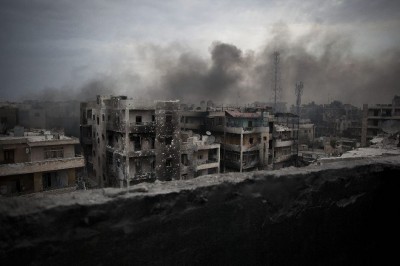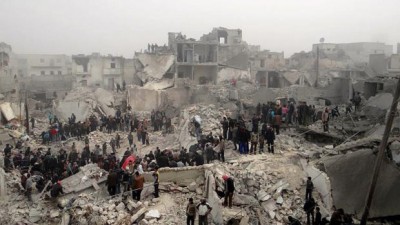
By: Joschka Fischer
TWO years after popular uprisings began to convulse the Middle East, few people speak of an “Arab Spring” anymore.
Given Syria’s bloody civil war, the rise to power of Islamist forces through free elections, the ever-deepening political and economic crises in Egypt and Tunisia, increasing instability in Iraq, uncertainty about the future of Jordan and Lebanon, and the threat of war over Iran’s nuclear program, the bright hope of a new Middle East has vanished.
Add the region’s eastern and western peripheries, Afghanistan and North Africa (including the Sahel and South Sudan), and the picture becomes even grimmer. Libya is increasingly unstable, al-Qa’ida is actively engaged in the Sahel (as the fighting in Mali shows), and no one can foresee what will happen in Afghanistan after the US and its NATO allies withdraw next year.
All of us tend to make the same mistake repeatedly. We think at the beginning of a revolution that freedom and justice have prevailed over dictatorship and cruelty. But history teaches us that what follows is usually nothing good.
A revolution not only overthrows a repressive regime; it also destroys the old order, paving the way for a mostly brutal, if not bloody, fight for power to establish a new one, a process that affects foreign and domestic policy alike. Normally, revolutions are followed by dangerous times.
Indeed, exceptions to this pattern are rare: South Africa is one, owing to the genius of one of the century’s most outstanding statesmen, Nelson Mandela. The alternative option can be observed in Zimbabwe.
Central and Eastern Europe after 1989, though a very interesting reference point for analysts of the Arab revolutions, is not an appropriate reference point, because the region’s new domestic and foreign order resulted from the change in external conditions stemming from the collapse of Soviet power. Internally, nearly all these countries had a clear idea about what they wanted: democracy, freedom, a market economy, and protection from the return of the Russian empire. They wanted the West, and their accession to NATO and the EU was logical.
Nothing of the sort applies to the crisis belt of the Middle East. No power anywhere, within the region or without, is willing and able to implement the barest vision of a new regional order or even a vision for parts of it. Chaos is a constant threat, with all of its accompanying threats to peace.
In addition to poverty, backwardness, repression, rapid population growth, religious and ethnic hatred and stateless peoples (such as the Kurds and the Palestinians), the region has unstable borders. Many were drawn by the colonial powers, Great Britain and France, after World War I, and most, with the exception of Iran’s and Egypt’s, have little legitimacy.
The most likely outcome in Syria is that the human catastrophe will continue until Bashar al-Assad’s regime collapses, after which the country very likely could be divided along ethnic and religious lines. And Syria’s disintegration could further Balkanise the Middle East, potentially unleashing new violence.
As if this were not enough, some countries – including Iran, Saudi Arabia and even tiny (but very rich) Qatar – have ambitions to be regional powers. All of this worsens an already tense situation.
All of these contradictions are exploding in Syria, where the population is suffering a humanitarian catastrophe while the world stands by, up to now unwilling to intervene. (If chemical weapons are deployed, intervention will become inevitable.) Although intervention would be temporary and technically limited, everyone seems to be avoiding it, because the stakes are very high: not only a devastating civil war and massive human suffering, but also a new order for the whole of the Middle East.
Any military intervention would entail a confrontation not only with the Syrian military (supported by Russia and China), but also with Shia Iran and its Lebanese proxy, Hezbollah. Moreover, no one can guarantee that intervention would not quickly lead to another war with Israel. The dangers of both action and inaction are very high.

The most likely outcome in Syria is that the human catastrophe will continue until Bashar al-Assad’s regime collapses, after which the country very likely could be divided along ethnic and religious lines. And Syria’s disintegration could further Balkanise the Middle East, potentially unleashing new violence.
Frontline states like Lebanon, Iraq and Jordan will not manage to remain aloof from a disintegrating Syria. What will happen with Syria’s Kurds and Palestinians or its Christians, Druze and smaller Muslim minorities? And what about the Alawites (the backbone of Assad’s regime), who could face a terrible destiny, regardless of whether the country splits up?
Unanswered questions abound. Of course, even in the face of this misery, we should not lose hope in agreements reached by diplomatic means; but, realistically, the chances are dwindling every day.
A new and stable order will take a long time to establish. Until then, the region will remain very dangerous, not only internally, but also for Europe and the world.
Joschka Fischer, Germany’s foreign minister and vice-chancellor from 1998 to 2005, was a leader in the German Green Party for almost 20 years
The Australian

Leave a Reply
You must be logged in to post a comment.